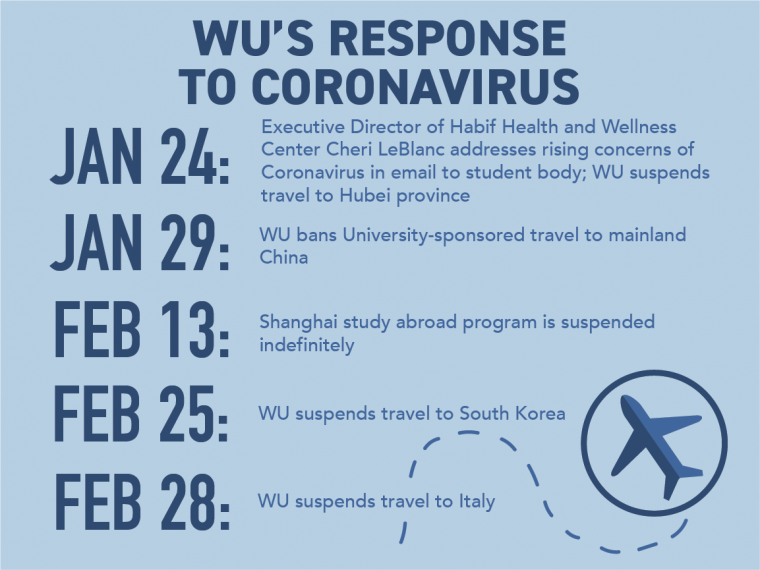Academics | News
WU sends students studying abroad in Italy home as fears of Coronavirus spread
Washington University extended its travel suspension to Italy, Feb. 28, resulting in widespread uncertainty for abroad students suddenly forced to return home.
 Graphic by Mia Goldberg
Graphic by Mia Goldberg The Italian government announced March 1 that the country had 1,694 confirmed cases of the coronavirus COVID-19, representing a 50% increase in just 24 hours. As the global death toll approaches 3,000, the national Centers for Disease Control and Prevention (CDC) and the United States Department of State (DOS) have upgraded the risk level for travel in Italy to a Level 3, indicating that all non-essential travel should be avoided.
Before the University implemented its travel suspension, Overseas Program Director Amy Suelzer shared a message from the International Travel Oversight Committee to students warning that students’ host institutions “may have to significantly alter, or in some cases suspend or cancel” their programs, Feb. 25.
The CDC and DOS updates prompted the University to extend its travel suspension, which now applies to Italy, South Korea and mainland China.
“We are working to make academic adjustments and will be in touch with details as promptly as possible,” Sam Fox Coordinator of Special Programs Courtney Cushard wrote in an email to students studying abroad in Italy. “We understand that there may be financial questions, and we will be addressing those next week.”
Junior Adina Loomis, who was a part of the Italian & European Studies Program in Padua through Boston University, said the cancellation was disappointing but not a complete surprise because so many other schools had already cancelled their programs.
“At this point, I’m just anxious for more information,” Loomis said. “The communication we’ve received seems to be telling us, ‘This is the information we can get you at the moment and you’ll be hearing more when we get more information.’”
For junior Jen Chadick, the news that her study abroad program in Milan had been cancelled came suddenly while she was traveling in other parts of Europe.
“They didn’t tell us anything before Friday night,” Chadick said. “It went from ‘We’re just monitoring the situation for a week’ to ‘Leave ASAP, don’t even go back to Italy to get your stuff, come back to the United States immediately.’”
Chadick emphasized how rapidly the situation had escalated in a very short period of time.
“All of the face masks and hand sanitizers are sold out,” Chadick said. “In Italy, it looked like there was an apocalypse and all of the supermarkets were wiped out—there wasn’t one piece of food in the supermarkets, and restaurants were closed, everything was closed. It looked like a ghost town.”
The uncertainty surrounding the situation has also created an extremely stressful situation for abroad students who have not yet been told to return to the States. Junior Delanie Ludmir, who is currently studying in Copenhagen, said that she feels very overwhelmed.
“The silence is the worst—not knowing and not hearing from our schools until we have to leave in 24 hours. I wish there was more transparency,” Ludmir said. “And it’s become everything people talk about—I think 50% of our conversations have been about coronavirus. So that makes it really frustrating, and it’s scary being away from home while all this is happening, especially when it’s being so sensationalized.”
One result of the sensationalism surrounding the coronavirus has been an uptick in racist rhetoric.
“The amount of xenophobia in Europe right now is insane,” Ludmir said. “My friend, who is Asian, was flying back from Spain and the woman next to her asked to be changed seats. If you’re Asian or Italian, people are very rude to you.”
Junior Griffin Orser, who was a part of the Sam Fox study abroad program in Florence, said that it is unclear what the remainder of his semester will entail. Along with the rest of the Sam Fox Florence program, he plans to return to campus after Spring Break to participate in a tentative mix of online and blended classes.
“It all seems very preliminary and…it’s subject to change depending on what they can figure out once we get back—it just seems like right now they’re kind of scrambling to figure out what to do, and so communication hasn’t been super transparent,” Orser said. “But I think that’s just because they don’t really know what to do as of right now and as Spring Break comes around they’ll probably figure it out more.”
Orser said that since the situation has been progressing so rapidly, he doesn’t blame the University for not having the most concrete answers.
“They’ve been as transparent as they can about what’s going on—it’s just that they’re thinking of all the problems they have to deal with right as we’re thinking of them,” Orser said. “No one really knows exactly what to do and it’s kind of chaotic.”
This sentiment was echoed by sophomore David Massey, whose trip to Sicily over Spring Break with his field geology class was recently cancelled. The course has been entirely focused around Sicilian geology specifically, making the cancellation especially disappointing.
“They’ve repeated again and again, ‘This is not amateur hour and we are not amateurs,’ so we’re putting our faith in them and we’re going to southern Utah,” Massey said. “Though we’re still trying to buy the flights and waiting for the refunds to go through and the vouchers to come out…it’s just a mess.”
Although he believes that the University is doing the best it can to handle the situation, Massey argued for the importance of doing more to inform students and others about the coronavirus on a broad scale.
“I think it’s being really played down, and I understand making people not feel nervous, because especially our age group is really not at risk, but it’s still something I think that the public should be more aware of, and I think we should be taking more action than we are,” Massey said.
